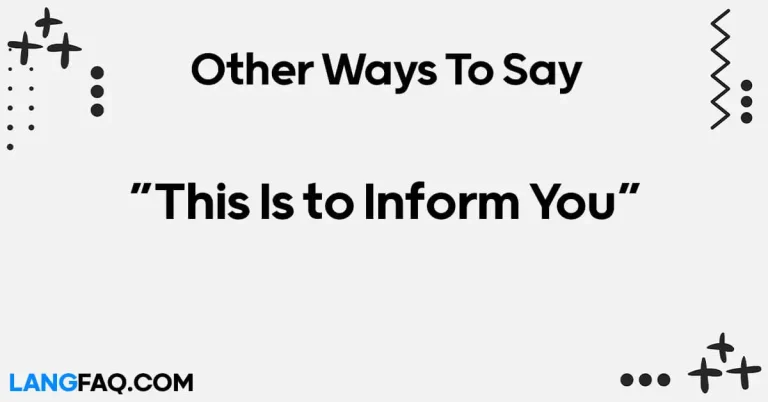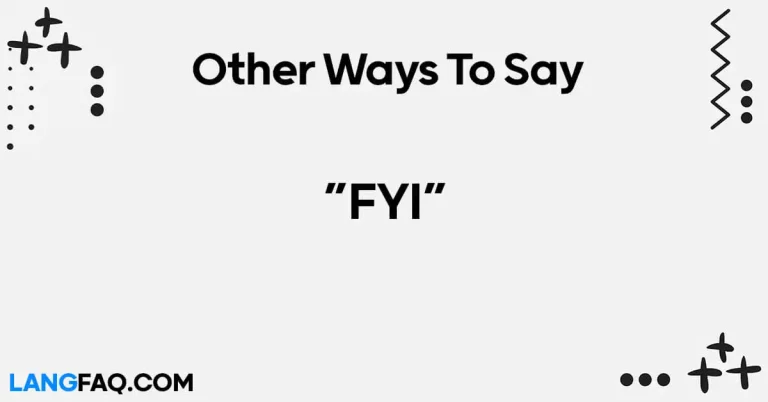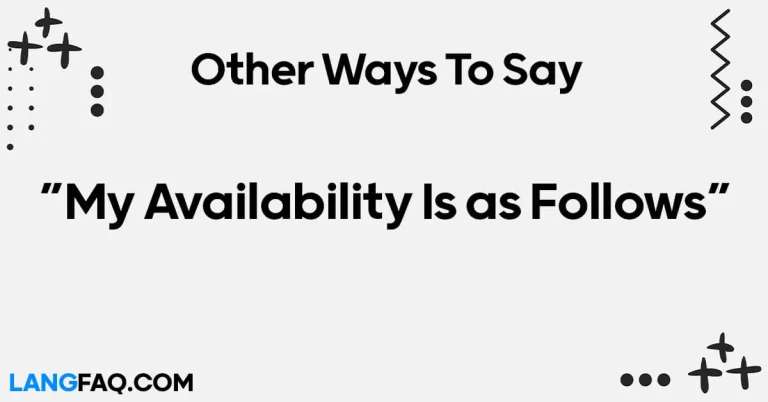Communication is key, and using varied expressions can significantly impact how your message is received. In this article, we explore 12 creative alternatives to the common phrase “Hope This Helps.” From casual idioms to formal expressions, let’s delve into ways to enhance your communication skills.
12 Other Ways to Say “Hope This Helps”
Here are 12 alternative expressions to convey the sentiment of “Hope This Helps”:
- Trust this proves beneficial.
- Wishing you success with this information.
- May this be of assistance to you.
- Let me know if there’s anything else you need.
- I’m at your disposal for further clarification.
- Hoping this proves valuable to your situation.
- Feel free to reach out if you require more guidance.
- Here’s to a positive outcome with this information.
- If you have any questions, I’m here to help.
- Best of luck incorporating this into your plans.
- I’m confident this will make a difference for you.
- Looking forward to hearing how this works out for you.
Here’s a table with meanings and examples for the 12 alternative expressions to convey the sentiment of “Hope This Helps”:
| Expression | Meaning | Example |
|---|---|---|
| Trust this proves beneficial. | Anticipating positive outcomes. | Provided the necessary information. |
| Wishing you success with this information. | Expressing hope for positive results. | Shared the details for your success. |
| May this be of assistance to you. | Offering help or support. | Here’s the information – may it assist you. |
| Let me know if there’s anything else you need. | Inviting further inquiry or assistance. | If you have questions, feel free to ask. |
| I’m at your disposal for further clarification. | Offering availability for help. | Available to clarify any points if needed. |
| Hoping this proves valuable to your situation. | Expressing a desire for usefulness. | Shared insights – hoping they prove valuable. |
| Feel free to reach out if you require more guidance. | Encouraging communication for guidance. | Open for any additional questions you may have. |
| Here’s to a positive outcome with this information. | Toasting to favorable results. | Providing information – here’s to a positive outcome. |
| If you have any questions, I’m here to help. | Offering assistance for inquiries. | Questions? I’m here to help. |
| Best of luck incorporating this into your plans. | Wishing success in application. | Applying this information – best of luck! |
| I’m confident this will make a difference for you. | Expressing assurance in impact. | This insight should make a difference for you. |
| Looking forward to hearing how this works out for you. | Eager anticipation of positive results. | Excited to hear about the positive outcomes. |
These alternative expressions provide a diverse set of ways to convey assistance, each carrying its own unique tone. Whether expressing optimism, offering availability, or encouraging further communication, these alternatives aim to enhance the effectiveness and positivity of your message.
Is It Correct to Say “Hope This Helps”?
Absolutely! “Hope This Helps” is a common and perfectly acceptable phrase used to convey goodwill and assistance in various contexts. It’s a polite and friendly way to express the desire that the information or support provided proves beneficial to the recipient. This phrase is often used in both professional and casual settings, making it versatile and widely understood.
When to Use “Hope This Helps”:
- Professional Emails:
- Example: “Attached are the documents you requested. Hope this helps in your analysis. Feel free to reach out for any clarification.”
- Customer Support Interactions:
- Example: “Thank you for contacting us. We’ve addressed your concerns. Hope this helps resolve the issue. If you need further assistance, please let us know.”
- Informal Conversations:
- Example: “I shared the recipe with you. Hope this helps you recreate that delicious dish! Let me know if you have any questions.”
- Collaborative Projects:
- Example: “I’ve completed my part of the project. Hope this helps move things forward smoothly. Looking forward to your input.”
Variations and Alternatives:
While “Hope This Helps” is widely used and understood, incorporating variations can add richness to your communication. Some alternatives include:
- “Wishing You Success”
- “Let Me Know If You Need Anything Else”
- “Here for Further Assistance”
- “Trust This Proves Beneficial”
Tips for Using “Hope This Helps”:
- Context Matters:
- Consider the formality of the situation. While “Hope This Helps” is versatile, more formal situations may benefit from slightly more refined expressions.
- Personalize When Necessary:
- Adding a personal touch, such as “Let me know if you have any questions,” can enhance the connection with the recipient.
- Be Genuine:
- Only use the phrase if you genuinely believe the information or assistance provided will be helpful. Authenticity is key.
In conclusion, “Hope This Helps” is a courteous and widely accepted way to express assistance. However, feel free to explore variations based on the context and your personal communication style.
Professional Mail Example With “Hope This Helps”
Subject: Assistance with Project Documentation
Dear [Recipient’s Name],
I trust this email finds you well. Following our recent discussion about the project documentation, I have attached the updated files for your review. Hope this helps streamline the process on your end.
Please take a moment to review the documents, and if you have any questions or require further clarification, feel free to reach out. I am here to ensure a smooth and successful collaboration.
Looking forward to your feedback.
Best Regards, [Your Full Name] [Your Position] [Your Company] [Contact Information]
Elevate Your Assistance
When aiming to convey a sense of sophistication and commitment, the phrase “Elevate Your Assistance” proves invaluable. This expression transcends the ordinary, suggesting a dedication to go above and beyond in offering help. Whether in a professional email or a formal context, this phrase exudes a refined level of service.
Example: Dialogue Snippet: Colleague: “I’m struggling with this project.” You: “No worries! I’m here to elevate your assistance. Let’s schedule a meeting to discuss your challenges.”
Email Sample:
Subject: Elevating Your Assistance for Project Success
Dear [Colleague’s Name],
I trust this message finds you well. I’m reaching out to offer my support in elevating your assistance with the ongoing project. Let’s connect at your earliest convenience to delve into the specifics and overcome any challenges together.
Best Regards, [Your Name]
Variations:
- Elevating Our Collaboration
- Elevate Your Support in Project Matters (Formal)
- Elevate Your Assistance, My Friend (Informal)
Extend a Helping Hand
“Extend a Helping Hand” is a versatile phrase that combines a sense of generosity with genuine concern. This expression is ideal for both formal and informal situations, indicating a willingness to provide support. It works well when communicating empathy and solidarity.
Example: Dialogue Snippet: Friend: “I’m going through a tough time.” You: “I’m here for you, always ready to extend a helping hand.”
Email Sample:
Subject: Extending a Helping Hand in Difficult Times
Dear [Friend’s Name],
I heard about the challenges you’re facing, and I want to extend a helping hand. Let’s catch up over coffee this weekend and talk about how I can support you.
Warm Regards, [Your Name]
Variations:
- Always Ready to Extend Assistance
- Extending My Hand in Support (Formal)
- Here’s My Helping Hand (Informal)
Here to Aid You
For a more formal setting, “Here to Aid You” strikes a balance between professionalism and approachability. This phrase communicates a steadfast commitment to assistance, emphasizing reliability in times of need.
Example: Dialogue Snippet: Colleague: “I’m dealing with a client issue.” You: “Rest assured, I’m here to aid you. Let’s address the client’s concerns together.”
Email Sample:
Subject: Here to Aid You with Client Matters
Dear [Colleague’s Name],
I understand the challenges you’re facing with the client. I want to assure you that I’m here to aid you in resolving the matter. Let’s schedule a meeting to strategize our approach.
Best Regards, [Your Name]
Variations:
- Always Available to Aid You
- Happy to Be of Assistance (Informal)
- Here to Support Your Endeavors (Formal)
In Your Service
“Formal elegance” defines the expression “In Your Service.” This phrase is particularly suitable for professional settings where a polished tone is essential. It conveys not just assistance but a dedicated and formal commitment to being of service.
Example: Dialogue Snippet: Manager: “We need to improve our client relations.” You: “Absolutely, consider it done. I’m in your service to enhance our client interactions.”
Email Sample:
Subject: In Your Service for Client Relations Enhancement
Dear [Manager’s Name],
I appreciate the focus on improving client relations, and I’m here to express my dedication to this goal. I’m in your service to ensure our clients receive the best experience.
Sincerely, [Your Name]
Variations:
- Always Ready to Serve You
- At Your Service for Professional Matters
- In Your Service Always (Formal)
Offering My Support
Adding a personal touch, “Offering My Support” is ideal for expressing genuine concern. This phrase is versatile, suitable for both professional and personal contexts. It conveys a sense of empathy and a willingness to stand by someone in their endeavors.
Example: Dialogue Snippet: Friend: “I’m nervous about the interview.” You: “Don’t worry, I’m here for you, offering my support. Let’s practice together.”
Email Sample:
Subject: Offering My Support for Your Upcoming Interview
Dear [Friend’s Name],
I heard about your upcoming interview and wanted to reach out, offering my support. If you need any assistance or want to run through some questions, feel free to let me know.
Warm Regards, [Your Name]
Variations:
- Always Ready to Offer Assistance
- Offering My Support in Professional Matters (Formal)
- Here for You, Offering My Support (Informal)
Providing a Helping Touch
“Providing a Helping Touch” injects warmth into your communication. It’s perfect for creating a positive and comforting atmosphere, especially when dealing with sensitive matters or offering emotional support.
Example: Dialogue Snippet: Family Member: “I’m feeling overwhelmed.” You: “I understand. I’m here, providing a helping touch. Let’s navigate through this together.”
Email Sample:
Subject: Providing a Helping Touch in Challenging Times
Dear [Family Member’s Name],
I heard that you’re going through a tough time. I want you to know that I’m here, providing a helping touch. Let’s connect soon and discuss how I can offer support.
With Love, [Your Name]
Variations:
- Always Ready to Provide Assistance
- Providing a Helping Touch in Difficult Situations
- Here for You, Offering My Support (Informal)
Here for Your Benefit
“Here for Your Benefit” communicates a sense of purpose and genuine concern. This phrase is effective in both formal and informal scenarios, emphasizing that your assistance is dedicated to the well-being and benefit of the recipient.
Example: Dialogue Snippet: Colleague: “I’m struggling with the project deadline.” You: “No worries, I’m here for your benefit. Let’s strategize to meet the deadline effectively.”
Email Sample:
Subject: Here for Your Benefit: Project Deadline
Dear [Colleague’s Name],
I understand the challenges you’re facing with the project deadline. Rest assured, I’m here for your benefit. Let’s collaborate to ensure a successful outcome.
Best Regards, [Your Name]
Variations:
- Always Ready to Benefit You
- Here for Your Benefit in Professional Matters (Formal)
- Here for You, My Friend (Informal)
Assisting with Care
Navigating the delicate balance of professionalism and empathy, “Assisting with Care” is a phrase that conveys competence and genuine concern simultaneously. This expression is well-suited for situations where a thoughtful and considerate approach is required.
Example: Dialogue Snippet: Client: “I have concerns about the product.” You: “Thank you for sharing. I’m here, assisting with care, to address and resolve your concerns.”
Email Sample:
Subject: Assisting with Care: Addressing Your Product Concerns
Dear [Client’s Name],
I appreciate you bringing up your concerns about our product. I want to assure you that I’m here, assisting with care, to address and resolve any issues. Let’s schedule a meeting to discuss this further.
Sincerely, [Your Name]
Variations:
- Always Ready to Assist You with Care
- Assisting with Care in Professional Matters (Formal)
- Here to Help, with Care (Informal)
Supporting Your Needs
“Supporting Your Needs” is a versatile expression that emphasizes a commitment to understanding and fulfilling the requirements of the recipient. It works well in both professional and personal contexts, showcasing a readiness to provide assistance tailored to specific needs.
Example: Dialogue Snippet: Friend: “I’m looking for advice on career choices.” You: “Absolutely, I’m here, supporting your needs. Let’s discuss your career options in detail.”
Email Sample:
Subject: Supporting Your Needs: Career Advice
Dear [Friend’s Name],
I heard that you’re contemplating some career choices. I want you to know that I’m here, supporting your needs. Let’s schedule a time to dive into your options and make an informed decision.
Warm Regards, [Your Name]
Variations:
- Always Ready to Support Your Needs
- Supporting Your Needs in Professional Matters (Formal)
- Here for You, Supporting Your Journey (Informal)
Ready to Serve You
“Ready to Serve You” expresses readiness and enthusiasm, making it a dynamic choice for various scenarios. This phrase conveys a proactive stance and is effective in both professional and informal settings, showcasing eagerness to assist.
Example: Dialogue Snippet: Customer: “I need assistance with my order.” You: “Absolutely, I’m ready to serve you. Let’s address your order concerns promptly.”
Email Sample:
Subject: Ready to Serve You: Resolving Your Order Concerns
Dear [Customer’s Name],
Thank you for reaching out with your order concerns. I want to assure you that I’m ready to serve you. Let’s connect at your earliest convenience to address and resolve any issues.
Best Regards, [Your Name]
Variations:
- Always Ready to Serve You
- Ready to Serve You in Professional Matters (Formal)
- Here for You, Ready to Assist (Informal)
Ensuring Your Satisfaction
Prioritizing satisfaction, “Ensuring Your Satisfaction” is a phrase that highlights commitment to delivering not just help but a positive experience. This expression is suitable for professional contexts where customer or client satisfaction is paramount.
Example: Dialogue Snippet: Client: “I have concerns about the service.” You: “Thank you for sharing. I’m committed to ensuring your satisfaction. Let’s address these concerns promptly.”
Email Sample:
Subject: Ensuring Your Satisfaction: Addressing Service Concerns
Dear [Client’s Name],
I appreciate your feedback regarding our service. I want to assure you that I’m committed to ensuring your satisfaction. Let’s schedule a meeting to discuss and address your concerns.
Sincerely, [Your Name]
Variations:
- Always Ensuring Your Satisfaction
- Ensuring Your Satisfaction in Professional Matters (Formal)
- Here to Help, Ensuring Your Happiness (Informal)
At Your Service Always
Embracing timeless charm, “At Your Service Always” conveys an enduring dedication to providing support whenever it’s needed. This phrase works well in both professional and personal contexts, creating a sense of reliability and trust.
Example: Dialogue Snippet: Friend: “I might need your help later.” You: “Absolutely, at your service always. Feel free to reach out whenever you need assistance.”
Email Sample:
Subject: At Your Service Always: Ready for Your Requests
Dear [Friend’s Name],
I heard that you might need assistance later. I want you to know that I’m at your service always. Whether it’s now or in the future, feel free to reach out whenever you need support.
Warm Regards, [Your Name]
Variations:
- Always at Your Service
- At Your Service Always in Professional Matters (Formal)
- Here for You, Always (Informal)
FAQs:
What inspired the exploration of alternative phrases for “Hope This Helps”? Delving into diverse expressions stems from a commitment to effective communication. By offering alternatives, individuals can choose expressions that resonate with their personal style and the context of their message.
Can these alternatives be used in formal and informal settings? Absolutely! The beauty of these alternatives lies in their versatility. Whether you’re sending a professional email or chatting with a friend, there’s an alternative that suits every scenario.
Why is positive communication important? Positive communication fosters better relationships, creates a conducive environment, and enhances overall well-being. Choosing uplifting phrases contributes to a more positive and collaborative atmosphere.
Is it essential to tailor expressions based on the recipient? Yes, understanding your audience is crucial. While some phrases may be universally appreciated, considering the individual preferences and cultural context can further enhance the impact of your message.
How can these alternatives improve customer service interactions? Using varied expressions shows a commitment to customer satisfaction. It adds a personal touch to interactions, making customers feel valued and supported.
Are these alternatives culturally sensitive? Certainly! The alternatives provided are chosen for their broad applicability. However, it’s essential to be mindful of cultural nuances and adapt your expressions accordingly.
Conclusion:
Mastering the art of expressing assistance goes beyond the conventional “Hope This Helps.” By incorporating diverse phrases, you not only elevate your communication but also demonstrate a genuine commitment to the well-being of others. Experiment with these alternatives, and watch your interactions transform into meaningful connections.







